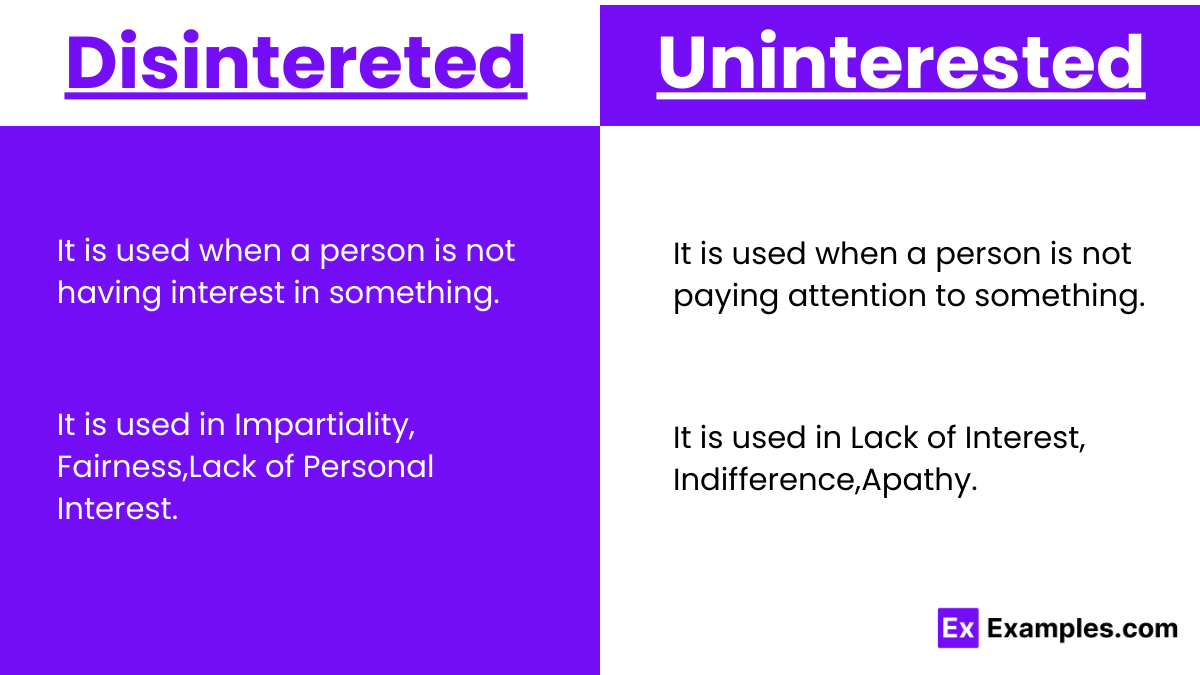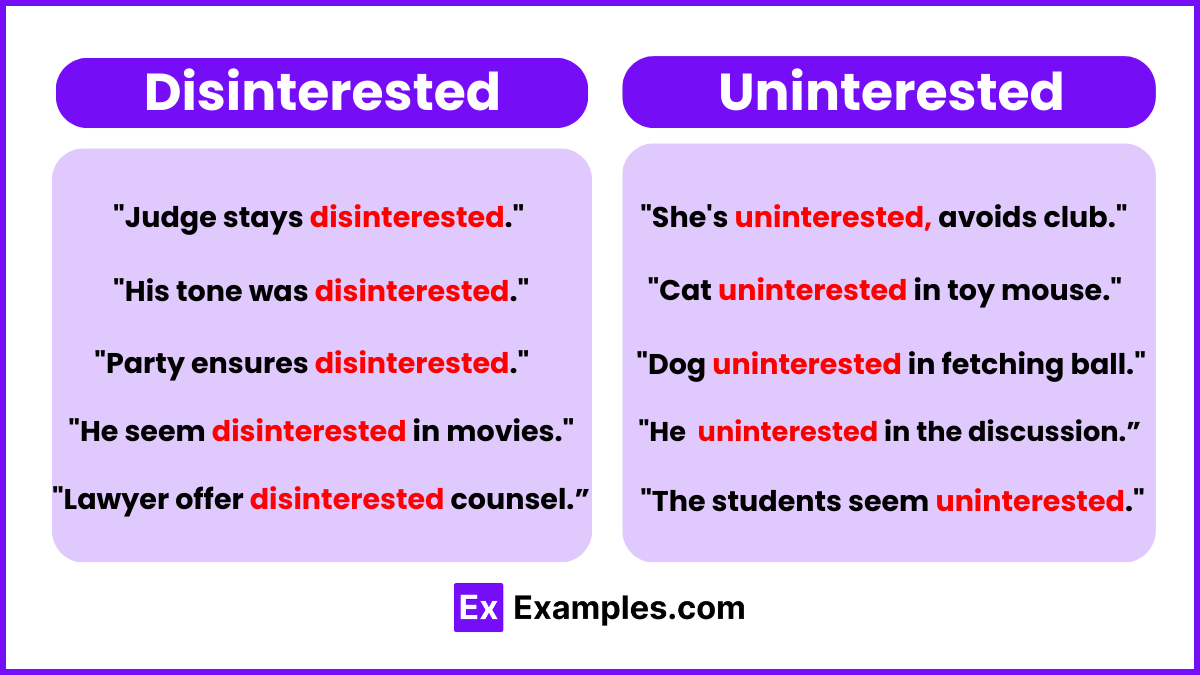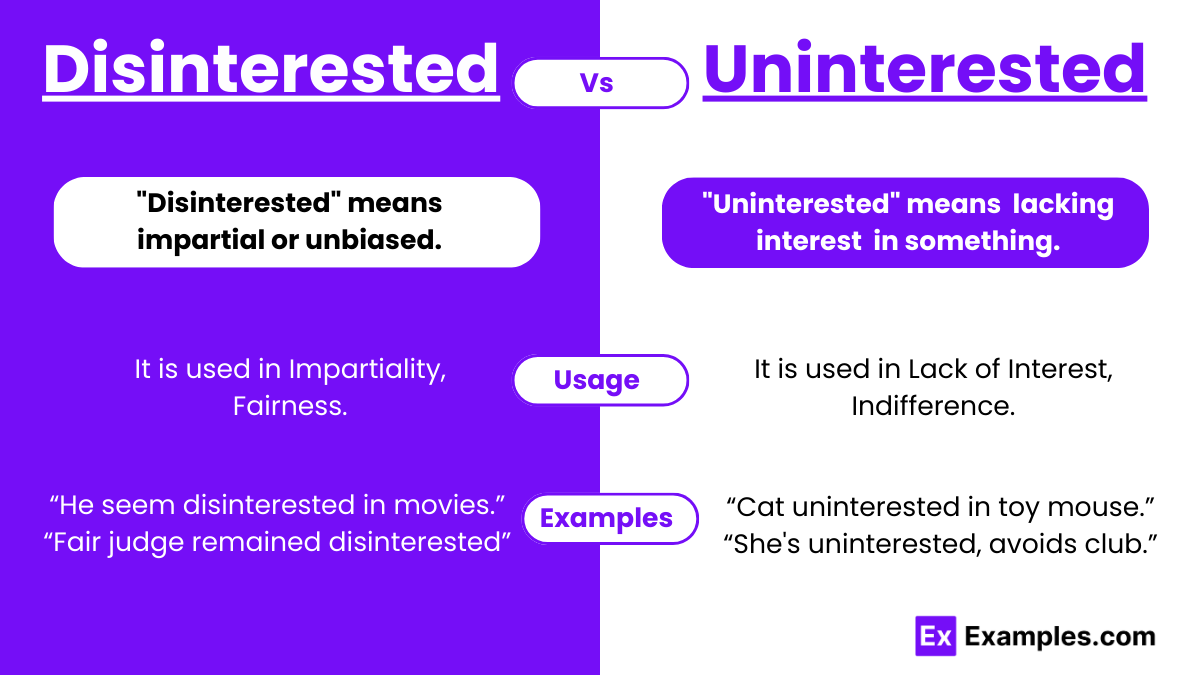Disinterested vs Uninterested – Meanings, Differences, Usage, Examples
“Disinterested” and “Uninterested” are often confused due to their similar spellings and pronunciations, but they have distinct meanings. “Disinterested” functions as an adjective, indicating impartiality or fairness, devoid of personal interest. Conversely, “Uninterested” also acts as an adjective, signaling a lack of engagement or enthusiasm towards a subject. Understanding these distinctions helps in precise communication, ensuring clarity and accuracy in conveying thoughts and ideas.
Disinterested and Uninterested – Meanings
- Disinterested : Disinterested means not taking sides or having a personal interest in something. It’s like being impartial or unbiased, looking at a situation without letting your own feelings or preferences influence your judgments.
- Uninterested : Uninterested means not interested or not paying attention. If someone is uninterested, they might seem bored or indifferent to whatever is happening. It’s like when you’re in class and you’re not interested in the lesson, so you start daydreaming or doodling instead of paying attention.
Summary
Understanding “Disinterested” means being fair and impartial, without letting personal feelings or preferences influence your judgment. It’s like being a neutral observer, looking at things objectively. On the other hand, “Uninterested” means you’re simply not interested or excited about something. It’s like when you’re bored or indifferent to a topic, and it doesn’t capture your attention. Knowing these differences helps you communicate clearly and ensures that your message is understood correctly in different situations.
How To Pronounce Disinterested And Uninterested
- Disinterested : Pronounced as dis-IN-tur-ist-ed / dɪˈsɪn.trɪ.stɪd.
- Uninterested: Pronounced as un-IN-tur-ist-ed / ʌnˈɪn.trɪ.stɪd.
Disinterested And Uninterested – Differences
| Feature | Disinterested | Uninterested |
|---|---|---|
| Context | Often used in discussions about fairness or ethics | Typically used to describe lack of interest |
| Implications | Indicates neutrality or objectivity | Suggests lack of concern or enthusiasm |
| Perspective | Indicates a lack of bias or personal investment | Suggests a lack of curiosity or involvement |
| Example Sentence | The judge remained disinterested throughout the trial. | He seemed uninterested in joining the conversation. |
| Connotations | Conveys a sense of fairness or detachment | Implies a lack of engagement or passion |
Tricks to Remember Disinterested And Uninterested
Disinterested:
- Think Neutral : Disinterested implies neutrality or impartiality, like a judge who has no personal interest in the case.
- Remove the Self : The prefix “dis-” often suggests a removal or negation. In the case of disinterested, it means removing personal interest or bias.
- Fairness Focus : Use disinterested when discussing fairness, objectivity, or impartiality, such as in legal or ethical contexts.
Uninterested:
- “Un” for Lack : The prefix “un-” typically indicates a negative or lack of something. Uninterested means lacking interest or enthusiasm.
- Emotionally Detached : Use uninterested to describe someone who is emotionally detached, indifferent, or bored.
- Engagement Absence : Think of uninterested as indicating a lack of engagement or involvement in a particular subject or activity
When To Use Disinterested And Uninterested

Usage of Disinterested
- Impartiality: Use “disinterested” when referring to someone who is impartial or unbiased in a situation where personal interest could affect judgment.
- Fairness: Employ “disinterested” when discussing fairness or objectivity, especially in legal or ethical contexts.
- Lack of Personal Interest: Use “disinterested” to describe someone who lacks personal interest or investment in a matter.
Usage of Uninterested
- Lack of Interest: Use “uninterested” to describe a lack of interest or enthusiasm in something.
- Indifference: Employ “uninterested” to indicate a lack of curiosity or engagement in a topic or activity.
- Apathy: Use “uninterested” when describing someone who is indifferent or apathetic toward something.
How To Use Disinterested And Uninterested
Disinterested
- Employ “disinterested” when referring to impartiality or lack of personal interest or bias.
- Use it in contexts such as legal proceedings, ethical debates, or objective assessments.
- Describe individuals or entities who can make unbiased judgments or decisions.
- Consider using “disinterested” when discussing fairness, objectivity, or neutrality.
Uninterested
- Apply “uninterested” to describe a lack of interest, enthusiasm, or engagement.
- Use it to indicate disinterest or indifference towards a particular subject or activity.
- Describe individuals who show no desire to participate or learn.
- Consider using “uninterested” in contexts where boredom or apathy is evident.
Disinterested And Uninterested – Examples

Disinterested Examples
- The judge remained disinterested in the outcome of the case, ensuring fairness
- The judge was able to disinterest herself from personal bias.
- The researcher observed the experiment disinterestedly, without any personal investment.
- She disinterests herself from petty office politics.
- The committee members, being disinterested parties, made unbiased recommendations.
Uninterested Examples
- He remained uninterested in sports, preferring to spend his time reading.
- he candidate seemed uninterested in the job during the interview, which affected their chances.
- The cat was uninterested in the toy mouse, choosing instead to nap in the sun.
- he students were uninterested in the math lesson, finding it dull and irrelevant
- The children appeared uninterested in the museum tour, yawning and fidgeting.
Synonyms For Disinterested And Uninterested
| Disinterested | Uninterested |
|---|---|
| Impartial | Indifferent |
| Neutral | Apathetic |
| Unbiased | Detached |
| Objective | Bored |
| Fair | Unenthusiastic |
Exercises
Q 1. The judge remained __________ during the case, ensuring fairness.
Q 2. She appeared __________ in the conversation, checking her phone frequently.
Q 3. It’s important to be __________ when evaluating job candidates.
Q 4. Despite the teacher’s enthusiasm, the students seemed __________ in the lesson.
Q 5. The committee member was __________ in the discussion, not taking any sides.
Answers:
A 1. disinterested
A 2. uninterested
A 3. disinterested
A 4. uninterested
A 5. disinterested
FAQ’S
What does it mean when someone is disinterested?
When someone is disinterested, it means they’re impartial or unbiased, not favoring any side.
What is a good sentence for disinterested?
A good sentence for “disinterested” could be: “The judge remained disinterested throughout the trial, ensuring a fair verdict for both parties.”
Can a person be both disinterested and uninterested at the same time?
yes, it’s possible. Someone could be disinterested in a particular topic or event due to their impartiality, while also being uninterested if they lack enthusiasm or engagement in it.
Can “disinterested” be used interchangeably with “uninterested”?
No, “disinterested” and “uninterested” cannot be used interchangeably. “Disinterested” means impartial or unbiased, while “uninterested” means lacking interest or enthusiasm. They convey different meanings and should be used accordingly.



